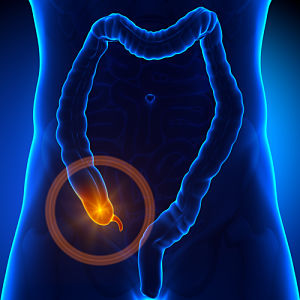
A computer generated drawing of the large intestine with a gold light at the beginning of the intestine
Your Appendix - What Does it Really Do?
Your appendix is a thin 4 inch tube that is connected to your large intestine. Normally it sits in your lower right abdomen. The function of the appendix is basically unknown. One theory is that the appendix serves as a storehouse for good bacteria to help "reboot" the digestive system after a diarrhea related illness. Another theory is that the appendix has no function and that removing the appendix causes no noticeable health problems.An appendix attack can cause severe pain in the lower part of the belly, along with nausea and vomiting. There are a number of ways to determine if you are having an appendix attack. It usually starts out as middle/lower or right/lower pain with fever and/or vomiting. If these symptoms last more than four hours, you should contact your doctor.
Diagnosing an attack is usually done by looking for the classic symptoms and a physical exam. Your doctor will push around on your lower abdomen to see if there is any tenderness. Lab work is usually done, also. This is to check for an elevated white count. An urinalysis may be done to rule out an urinary tract infection or pregnancy. If your doctor is still not sure, he may do a CT Scan of the abdomen and pelvis to help evaluate the problem. Ultrasound is commonly used in small children to avoid exposure to radiation.
An attack of your appendix can not be cured at home. If you think you are having an attack, seek medical attention. Avoid eating or drinking in case you need surgery. Do not use laxatives, antibiotics or pain medication because they may delay diagnosing the problem.
The best treatment is to remove the appendix. This can usually be done via laparoscopy. This entails a procedure where small keyhole incisions are made and the surgeon uses a camera guidance system to help remove the appendix. Recovery from this is minimal. In rare cases, the patient may have an open appendectomy, which will result in a much longer recovery.
If you or someone you know show symptoms of an appendicitis, contact your local physician or call Sabetha Family Practice at (785) 284-2141 to make an appointment.
